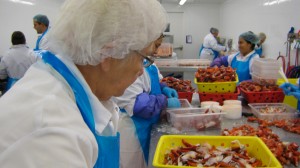TRIBECA REVIEW: ‘Downeast’

David Redmon and Ashley Sabin’s new documentary, Downeast, chronicles the struggles of an Italian immigrant and his quest to open a brand-new lobster processing plant in Gouldsboro, Maine. It doesn’t exactly sound like an invigorating premise for today’s moviegoing public, but Downeast is a riveting testament of how difficult it can be to conduct business in the United States, especially during an economic recession.
For years, Gouldsboro was the home of a well-known sardine cannery, a facility that employed many locals, most of whom were well over retirement age. When the sardine plant shut down, the small coastal village took a tremendous hit. Unemployment grew and prospects for the future looked bleak.
Then came Antonio Bussone, president of a Boston-based lobster company, who had the novel (and perhaps naive) idea to turn the old sardine cannery into a lobster processing plant. Up until that point, lobsters caught off the shores of the United States were sent to Canada and elsewhere for processing, and then sent back to the 50 states for consumption. Bussone wanted Gouldsboro to disrupt that chain of events.
But all was not easy. Money problems plagued the lobster plant’s opening months, and local government officials grew suspicious of Bussone’s intentions and how the new facility might eat into their established fishing profits. Still, the people of Gouldsboro, who had been out of work for many months, wanted Live Lobster up and running. Their livelihood largely depended on it.
Watching Bussone’s struggles to overcome so many obstacles is something akin to The Old Man and the Sea. At every corner, he is met with an insurmountable task to get the facility off the ground. Even after the lobster processing begins, financial woes with his Boston bank threaten to squander everything.
Downeast, which is the nickname for coastal Maine, provides one of the best real-life portraits of how the economy can forever affect a community. Redmon and Sabin capture many different perspectives of Gouldsboro, from Bussone’s behind-the-scenes negotiating to the home life of the rank and file. All the while, one gets the impression that the United States has changed in a subtle, yet drastic, manner. At the heart of the complicated story is a company trying to provide jobs to a struggling community. Yet, it becomes too overbearing and difficult. Federal grants are near impossible to secure, and banks have short leashes on their loaned money. The idea of the “American Dream” and a sense of entrepreneurship and self-worth are in short supply.
And, Gouldsboro’s struggles with the lobster processing plant continue to this day, and the future doesn’t hold much promise.
The 76-minute film, which recently ran at the Tribeca Film Festival, is less a portrait of coastal life and the fishing industry, and more a look at the economic recession from the ground level. We get a rare view into the homes of the unemployed, into the hearts of good people who need to get back to work, into the diminishing twinkle in the eyes of so many who relied on a little elbow grease for so long.
By John Soltes / Publisher / John@HollywoodSoapbox.com


